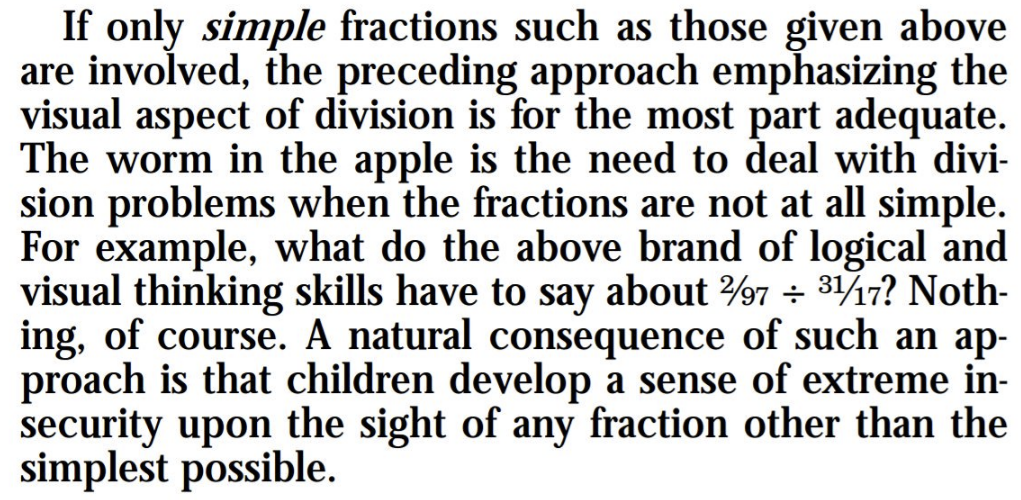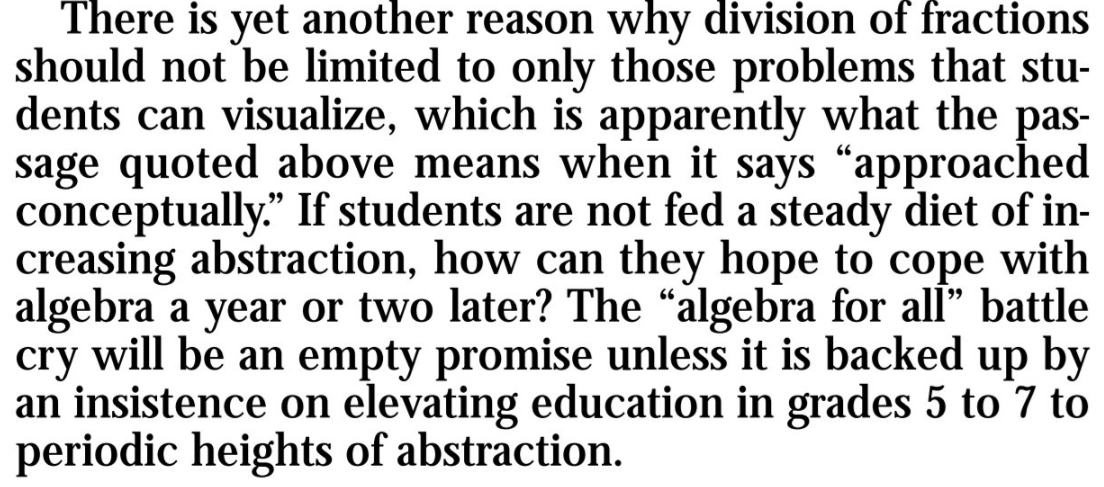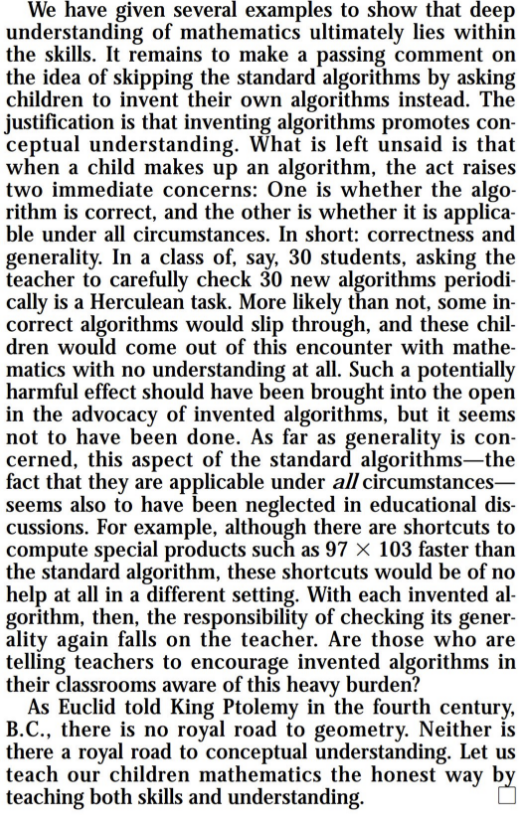A real variety of content in TOT this week : )
One and two both follow the theme of teacher burnout. Takeaway 2 (t2) is the story of one teacher, from breakdown to calm and security (quite short), t1 is 10 great points on how to cut corners when you’re super under the pump. Obviously we want quality over corner cutting, but this is the real world we live in, and it’s important to know what can give, if only for a week or so, when you’re burning out.
Takeaway 3 is the best paper I’ve ever read on the basic skills vs. conceptual understanding debate.
Takeaways 4 and 5 are well worth checking out. David Wees offers some great advice (again, a short article) in t4. With some great leadership advice/reflections in the TER Podcast for t5.
7 is just solid.
8 is for the tech-heads on twitter.
9 is more humanities focussed (on the punishing reach of racism for black boys in the U.S), and also shows some of the new ways that data scientists are communicating data in really powerful ways. Well worth a skim, will only take you 20 seconds to get a feel for the visualisations.
10,11 and 12s’ titles speak for themselves.
Enjoy : )
(all past TOTs here), sign up to get these articles emailed to you each week here.
Feeling burnt out? Here are some corners you could think about cutting, via @JennyPickerill
Part of good teaching is staying in teaching. Here are some options for those feeling overwhelmed. (Thread from a Uni academic, but still very applicable)
(Original thread here)
How do I fit my academic job into a 37 hour week? I don’t, I couldn’t possibly because this job is impossible to do/ complete/ control. But I am not willing to give my life to it or work longer hours unpaid, so here are 10 ways I survive:
1. Cut corners – I speed read (badly), I make quick decisions, I don’t read papers before a meeting, I delete emails based on the subject heading alone.
2. Don’t over prepare teaching – I have to ad lib sometimes, I limit my prep time deliberately, I do my best in the limited time available, I only try one new technique a year, I don’t dwell on a bad lecture/ seminar/ evaluation.
3. Teach the way I like – if it is enjoyable for me I hope my students will feel enthused, I don’t waste time trying to teach like others (I try to be accessible + inclusive but see pt.2).
4. Time my marking – I give each essay/ exam the time my Uni pays me to mark it (which is not a lot).
5. Avoid others’ agendas – I am cautious of being pulled into things, I take my time before agreeing to invitations/ collaborations/ favours.
6. Allocate realistic time to tasks in my calendar – I know what has to be done each week and when I am going to do it. When this gets disrupted I know what time needs to be taken from something/ somewhere else or cancelled.
7. Do my share of admin – but don’t do it all, push back on bureaucracy, prioritise the things that will make a difference to the department, staff, students. Ignore some demands/ meetings/ emails.
8. Do just enough – I made a list of things I dislike doing but have to do (like grant applications) or find time consuming (like conferences) and have a yearly target. Once reached I do no more.
9. Allocate days either to teaching + admin OR research. They don’t mix.
10. Spend time on the nourishing parts of the job – I protect and cherish reading + writing days, enjoy face to face teaching + supervison, love fieldwork, and find chatting and laughing with colleagues vital.
Teaching isn’t always a breeze, via @MrsHumanities
Teaching isn’t always a breeze. https://t.co/FoEfdmuP07
— Oliver Lovell (@ollie_lovell) April 17, 2018
Best article on Basic Skills vs. Conceptual Understanding I’ve ever read (MUST read for Maths Teachers!)
The eternal question/debate/challenge/false dichotomy? Here are some snippets from the best article on this topic I’ve ever seen!
Wu, H. (1999). Basic skills versus conceptual understanding. American Educator, 23(3), 14-19.
How can I make the most out of Ed Conferences?, via @davidwees
Short piece with solid advice on how to make the most of a conference – https://t.co/xE2p2PpOCM via @davidwees
— Oliver Lovell (@ollie_lovell) April 18, 2018
Great podcast on Ed Leadership, via @TERPodcast, @Capitan_Typo
Really enjoyed this Podcast by Teachers’ Education Review. 2 takeaways:
1.Leadership should be a way by which the leader is fully expressing, rather than suppressing their true self.
2. It isn’t about work life balance (which suggests a trade off) , but work life integration (synergy). Wisdom from Dr Leoni Degenhardt in https://terpodcast.wordpress.com/2018/04/15/ter-topics-leadership-in-education/
Fostering self-regulated learning AND retrieval practice!
Haven’t read yet, but it’s on the list. Can’t wait!
The paper I’ve been waiting for! Fostering self-regulated learning and retrieval practice. https://t.co/cntiHiJ6qg pic.twitter.com/7CydUTdTfN
— Oliver Lovell (@ollie_lovell) April 18, 2018
Five Evidence Based Papers All Teachers Should Read, via @LeadingLearner
Solid list. I used Coe’s ‘What makes great teaching?’ as the basis for our Senior Maths team’s student feedback survey.
5 Evidenced Based Papers All Teachers Should Read https://t.co/rWLFjkQQuf via @LeadingLearner
— Oliver Lovell (@ollie_lovell) April 18, 2018
Doing research on Twitter? You NEED to know about TAGS, via @mhawksey
Mind blown. App to instantly collate a bunch of search results from twitter https://t.co/MTaiAMPwfH via @mhawksey pic.twitter.com/N2bLnYN31Y
— Oliver Lovell (@ollie_lovell) April 16, 2018
This is a pretty amazing data visualisation
Extensive Data Shows Punishing Reach of Racism for Black Boys https://t.co/bpI5ltPPcl via @UpshotNYT
— Oliver Lovell (@ollie_lovell) April 13, 2018
For physics teachers: Circuit diagram drawing tool
Physics teachers!!! I just found a website, https://t.co/5ttgyOG2EI, that has a circuit diagram drawing tool. Check it! (@BenRogersEdu ) pic.twitter.com/D0zR9bJMBE
— Oliver Lovell (@ollie_lovell) April 13, 2018
Another article on the importance of care when interpreting effect sizes, via @RobertSlavin
More on effect sizes and how we must be careful when interpreting them… https://t.co/X08UPsImBY via @RobertSlavin pic.twitter.com/lKJWf6oaYW
— Oliver Lovell (@ollie_lovell) April 13, 2018
The goldilocks principle: Balancing freedom and constraint is best for societies
The goldilocks principle rears its head again. How balancing freedom and constraint is best for nations. https://t.co/YYWBQ007qT
— Oliver Lovell (@ollie_lovell) April 13, 2018



